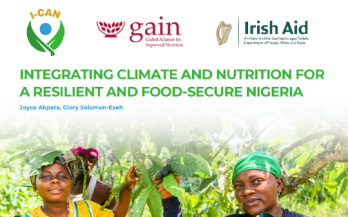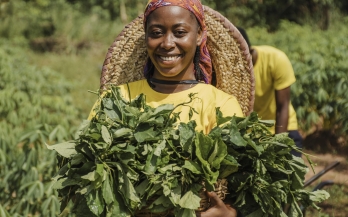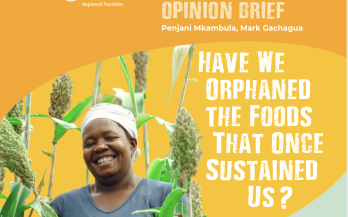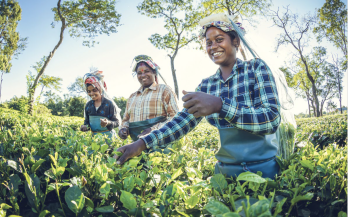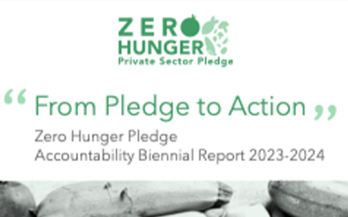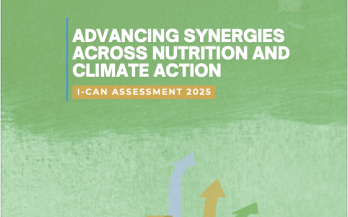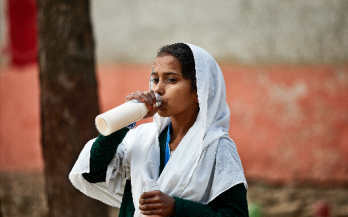- 09/02/2026
Nigeria faces overlapping crises of climate change and malnutrition, with rising temperatures, erratic rainfall, and extreme weather reducing crop yields and pushing 30.6 million people toward severe food insecurity in 2026. Most climate and nutrition policies operate in silos, limiting coordinated action, while existing links remain largely analytical rather than practical. Integrating climate-smart agriculture, water management, and community resilience initiatives can create “win-win” outcomes, strengthening food security and health—but urgent collaboration across government, civil society, and the private sector is needed to turn commitments into local solutions.
- 22/12/2025
Nigeria’s food systems are critical for national development, yet women face
deep-seated gender inequalities that restrict their participation, productivity, and access to resources, significantly hindering overall food security.
Achieving a resilient and equitable food system requires moving beyond genderneutral rhetoric towards intentional policy shifts, fostering inclusive governance, and investing in gender equity across the entire food system.
Prioritise equitable access to productive resources, strengthen women’s leadership in decision-making, enhance gender-disaggregated data systems, and champion community-led social norm change to build a sustainable food system where no one is left behind.
- 15/12/2025
Global food systems generate significant socio-economic impacts (or externalities) – both positive and negative – which greatly vary across geographic regions, supply chains, and production systems.
- 04/12/2025
Orphaned crops refer to a diverse group of foods, including cereals, legumes, vegetables, and fruits, that have been largely overlooked by mainstream agricultural research, breeding programs, and markets.
Many orphan crops contain higher concentrations of vitamins, minerals, and protein than major cereals. In soci eties facing a double burden of undernutrition and rising diet-related diseases, orphaned crops provide a crucial bridge. They nourish without harming.
Nutrition education in schools and public health programs can normalize the consumption of traditional foods, while media and culinary initiatives can make them fashionable. Changing perception is just as critical as changing production.
- 28/11/2025
Global food systems face complex, multi-faceted challenges that greatly vary by context, and their environmental, health, and socio-economic impacts are equally diverse. A comprehensive understanding that integrates these disparate factors into unified, clear guidance is essential for decision-making, including policy measures and industry practices.
- 21/11/2025
This White Paper makes the case for a territorial governance approach that reinforces urban–rural linkages by empowering local actors and enabling their collective agency. Local, traditional, and farmers markets serve as strategic hubs that offer multiple levers and diverse forms of capital for transforming food systems within cities, across urban–rural interfaces, and throughout wider territorial landscapes. Investing in both hard (physical) and soft (capacity-building) market infrastructure, supporting diverse knowledge systems, and advancing inclusive “whole-of-society” governance are essential steps toward unlocking resilient and sustainable food systems now and in the future. With these foundations in place, communities, governments, and sectors can routinely apply best practices and participate meaningfully in decision-making processes that foster a wide range of regenerative, biodiverse food value chains. Such systems create market and food environments characterized by vibrant public spaces; access to affordable, safe, culturally preferred, healthy diets; reduced and valorized food waste; and opportunities for dignified, prosperous livelihoods.
- 18/11/2025
Much of today’s headline news paint a grim picture — numerous crises unfolding alongside a sharp decline in global solidarity and the withdrawal of the private sector from net-zero commitments. The unity that inspired the 2030 Agenda for Sustainable Development a decade ago now feels increasingly distant.
Yet, the embers of that spirit, which imbued the launch of the Zero Hunger Private Sector Pledge in 2021, remain.
- 13/11/2025
GAIN’s contributions were made possible through the Nourishing Food Pathways programme, which is jointly funded by: German Federal Ministry for Economic Cooperation and Development; Ministry of Foreign Affairs of the Netherlands; European Union; government of Canada through Global Affairs Canada; Irish Aid through the Development Cooperation and Africa Division; and Swiss Agency for Development and Cooperation of the Federal Department of Foreign Affairs. The findings, ideas, and conclusions contained presented here are those of the authors and do not necessarily reflect positions or policies of any of GAIN’s funding partners.
The handbook is also supported by the Federal Ministry for Economic Cooperation and Development (BMZ) and Deutsche Gesellschaft für Internationale Zusammenarbeit (GIZ).
- 05/11/2025
The I-CAN Assessment 2025 aims to provide a snapshot into the current state of integration between climate and nutrition action across 16 indicators in policy and finance. Despite modest progress since 2023, the report makes clear that integration of climate and nutrition in key international and national policies and financing remains limited, slowing progress towards both reducing malnutrition and climate goals. However, the report also helps to highlight priority areas for action, spotlighting examples of best practice we can learn from as we progress into the second half of this critical decade for the SDGs and climate action.
- 22/10/2025
As Pakistan advances its URAAN Plan and National Food Systems Transformation Pathway, meaningful youth engagement will determine how inclusive that progress becomes. Despite strong national frameworks and growing youth-led innovation, young people remain largely outside formal decision-making. This policy brief sets out practical actions to institutionalise youth participation across governance structures—embedding the Scaling Up Nutrition Youth Network (SYN) within national and provincial coordination bodies, assigning youth advisory roles and quotas, and establishing a Youth in Food Systems Working Group to align mandates and financing. It further calls for building leadership pipelines through a Youth Food Policy Fellowship, integrating national programmes like Kamyab Jawan with food system priorities, and introducing digital accountability tools such as a Youth Engagement Scorecard. By embedding youth as architects of transformation, Pakistan can turn its demographic strength into a lasting engine for innovation, accountability, and resilient food systems.
